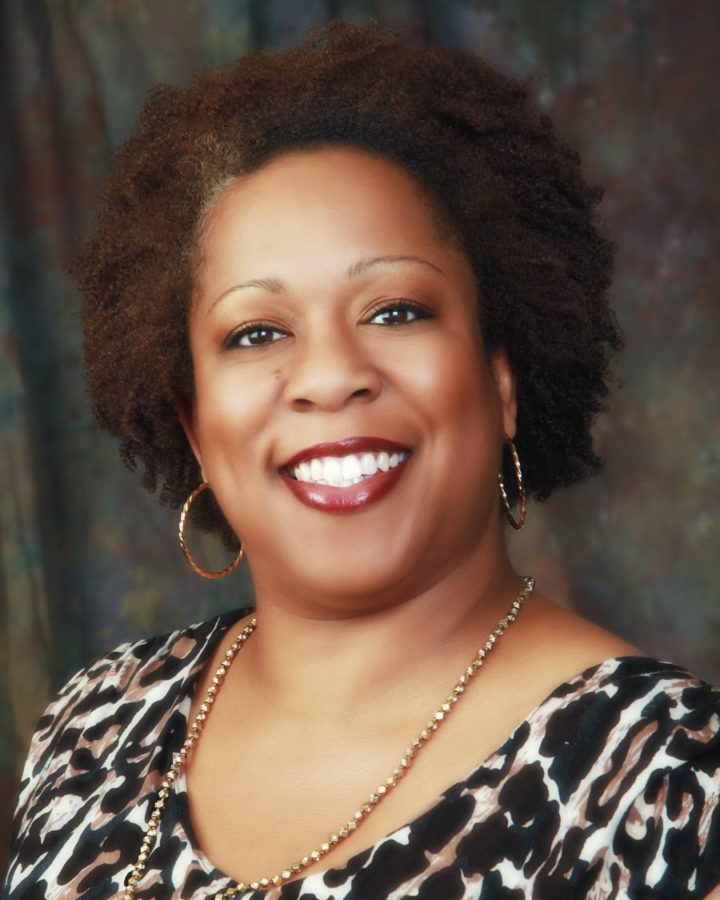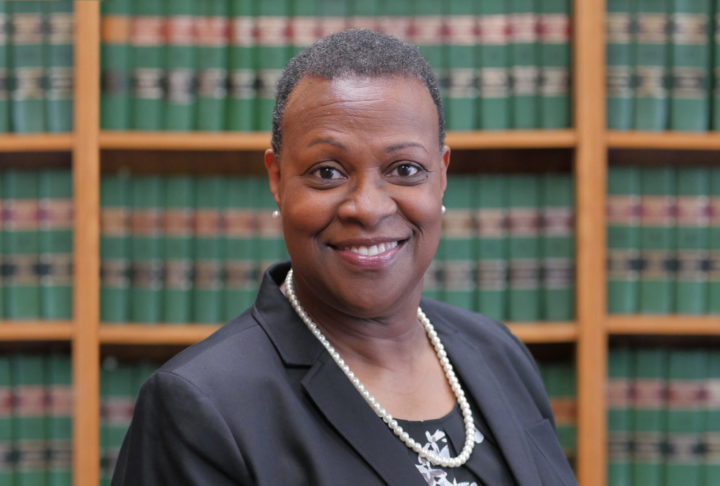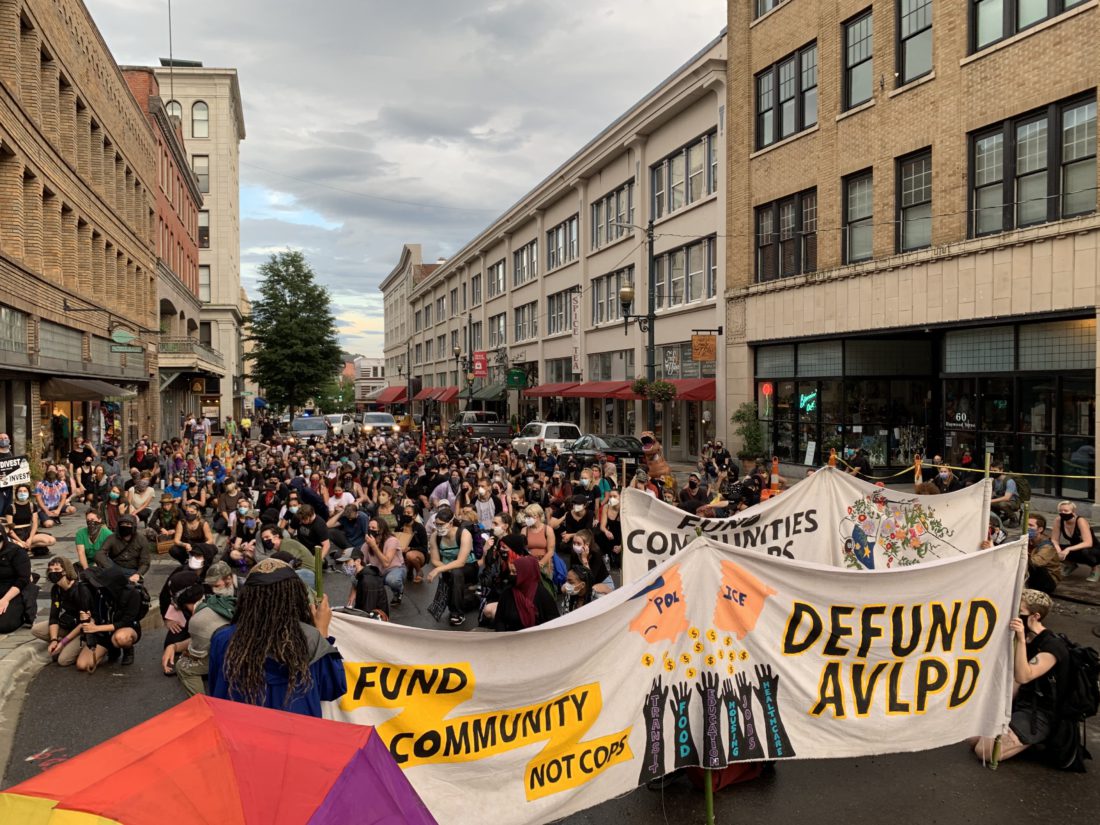Editor’s note: Following this story’s Aug. 25 print publication, the city of Asheville has added job postings for three open positions at its Office of Equity and Inclusion.
Asheville’s Office of Equity and Inclusion once appeared to be at the forefront of a national movement, remembers former Asheville City Council member Keith Young.
“Other folks from around the country looked at us as a North Star,” says Young, who spearheaded the creation of the department in 2017. As of September 2020, according to the City Mayors Foundation, only 32 U.S. municipalities had equity offices, primarily larger cities such as Atlanta, Boston and New York City.
The office, tasked with identifying and eliminating racial and other social disparities in government practices, quickly became central to high-profile city issues such as police reform, reparations and discrimination against LGBTQ community members.
But today, the department finds itself without any permanent staff and has no public process for hiring new employees. The vacancies come after a wave of resignations from the office, as well as public criticism from former employees and elected leaders about a lack of support and accountability for equity work.
When asked whether Asheville was considering closing the office, city spokesperson Polly McDaniel told Xpress the question was “out of line and offensive.” She referenced a July 28 press release, which noted that the positions would be filled under interim Director Brenda Mills.
Yet the city did not respond to three separate requests for information regarding the hiring process for a new permanent director, and no job listings for Equity and Inclusion staff were posted on the city’s website as of press time. McDaniel also did not disclose whether the city was working with a consulting firm to aid in the process or when the department expects to fill the positions.
Xpress has filed a public records request with the city in an attempt to answer these questions. In the meantime, former employees, city leaders and community activists shared their thoughts on the history of the office and why it has struggled to retain staff.
High hopes
“Equity became the No. 1 issue not even two months into my first term as a Council member,” Young remembers.
After his election in 2015, Young participated with other Council members during their yearly retreat in January 2016, when equity was listed as a top focus area. At the time, Young pointed out that, without continuous effort and review, racial equity “is not just autonomously there.” That same year, Council created a 20-year plan for the city, Vision 2036, which listed “an equitable and diverse community” as a strategic priority.
Young also began working with then-City Manager Gary Jackson to examine rates of contracting with minority and women-owned businesses over the last several years. The person overseeing that work was Mills, who had worked for roughly 10 years as the city’s minority business coordinator.
Sensing that Mills and the city had failed to make progress on the issue, Young, with the help of Jackson and others, created the Office of Equity and Inclusion in July 2017. Jackson hired Asheville’s first equity and inclusion manager, Kimberlee Archie.
But as the city seemed poised to make strides in equity and racial justice, Asheville was rocked by footage, published by the Citizen Times in February 2018, showing the arrest and beating of Asheville resident Johnnie Rush, a Black man, by former white Asheville Police Department officer Christopher Hickman. Jackson was abruptly fired less than a month after the video came to light.
Despite that shakeup, by 2019 the equity and inclusion department had been fully staffed with three other employees. A new citizen board, the Human Relations Commission of Asheville, was also convened in June 2018 to complement the department’s work and make recommendations to city leaders.
“It is our expectation to make sure that everyone knows what equity really is about and how to operationalize it on a daily basis in our work as a city,” Archie told Xpress in 2019.
Calling it quits
Debra Campbell was hired in January 2019 to fill the vacancy left by Jackson, becoming Asheville’s first Black city manager and the first woman to hold the position on a permanent basis. But as she settled into her role, Young says that staff members at the Office of Equity and Inclusion began mentioning that they did not feel supported by city leaders, including Campbell.
“I would check in and have conversations with folks, and those conversations led to, ‘She’s not paying attention to us. I haven’t talked to her in a year. She hasn’t checked in,’” Young says. He notes that staff’s frustrations grew further in the aftermath of Asheville’s spring 2020 racial justice protests following the police murder of Black Minneapolis resident George Floyd.
Tensions finally boiled over between the office’s employees and city leaders when Archie claimed in an Aug. 5, 2020, letter addressed to Campbell and shared with the Citizen-Times that Asheville lacked “accountability and in many cases the inability for self-reflection and motivation for change” on racial equity issues.
“This is not new information for you, Debra, as I have shared my perspective and many of my experiences with you over the last year and a half,” Archie wrote. The director subsequently resigned on Aug. 28, 2020.
Archie, who now works as an independent anti-racism consultant in Charlotte, told Xpress on Aug. 11 that she was “not interested in discussing the city of Asheville and the decisions they are making regarding racial equity.”
Campbell told Xpress in a statement that Archie had been “instrumental in raising awareness and beginning the work of equity and inclusion” culture change at the city, and that Asheville had made significant progress under her leadership.

“But we also recognize that culture change is hard, it takes time, and this is not an easy task,” Campbell continued. “I agree that more work needs to be done, and we are committed to continuing to grow and to fully incorporate this value into everything that we do.”
“Part of the role that she was in was to bring attention to these issues, and I think she did experience some frustration that they were not being addressed quickly enough or to her satisfaction. And part of that is culture change takes time,” Mayor Esther Manheimer says of Archie’s departure. “I think it is very frustrating to work in an organization like a city or a county or a state — any kind of institution where you walk around and see, plain as day, issues that need to be addressed — and you point them out and people don’t immediately address them. That’s valid, and I share that frustration.”
Breaking point
A month after Archie’s resignation, former Council member Young publicly pressed Campbell on her lack of involvement with the department and called for an immediate review of the city manager during Sept. 22 Council meeting.
“What I’m about to say next pains me because I have so much respect for someone in this position, as a Black woman who has done a remarkable job for us on many levels so far. But I have an obligation to be objective,” Young said during the meeting. “Over an extended period of time, it’s become abundantly clear to me — disregarding all my own personal feelings and likability for our city manager — that the Department of Equity and Inclusion is not part of the culture in city government, nor is it being supported from a managerial standpoint to help facilitate the culture that helps brings folks in line on the course set out by Council.”
Young went on to say that he had asked for the equity manager to participate in Council briefings and that an equity lens be applied to everything the city did, but to no avail from Campbell.
“Why did our equity manager depart in the manner that she did?” he asked.
“We cannot use equity to check a box and then speak as though we are addressing cultural change when it appears to be merely window dressing, from my vantage point.”
Campbell did not respond to Young’s remarks during the meeting, and his colleagues on Council defended the city manager. After Young spoke, former Council member Julie Mayfield said during the meeting that “in light of some comments earlier, Debra I trust your judgment implicitly, and I trust you to continue to lead our equity efforts in a way that will get our city to where we want to go.”
Council member Gwen Wisler echoed Mayfield comments, saying she continued to be amazed by Campbell’s work within the city. “I can’t say thank you enough,” she said.
In recent comments to Xpress, Manheimer said that she also did not support Young’s criticisms, which she called “quite harmful to the city manager.” She added that Young “received a lot of backlash from that”; he went on to lose reelection in November 2020.
Party of one
The three staff members at the Equity and Inclusion Department remaining after Archie’s resignation left their posts over the following year, with the last leaving in July. Only one was willing to provide a statement to Xpress about her departure.
“My hope is that city leadership will encourage and support staff doing equity and inclusion work and take the feedback that I and my previous colleagues have offered,” says former Equity and Inclusion training consultant Paulina Mendez, who now works as the Family Justice Division manager for Buncombe County. “The road to achieving equity can be difficult at times, and in the long run, it’s worth it.”
And former Assistant City Manager Richard White, who had also filled the role of interim director at the equity and inclusion office since fall 2020, announced on July 13 that he would leave the city — having been hired in July 2019 — to become Carrboro’s city manager, a move that resulted in a lower salary.

The city announced on July 28 that Mills, who had worked on city contracting with minority and women-owned businesses prior to the equity and inclusion office’s creation, would serve as its interim director. Mills had changed departments in 2017 to serve as a community engagement manager for Asheville’s Communication and Public Engagement Department.
According to a press release, Mills helped the Equity and Inclusion Department complete a 2018 study on disparity in city contracting with minority and women-owned businesses. She has also been active in the Government Alliance on Race and Equity, a national network of governments working to achieve racial equity, through trainings and meetings.
“[Mills] is well connected throughout our city departments and the community. People have confidence in her, and they like to see her coming because they know she gets things done,” says Campbell. The interim director will also be tasked with filling the office’s vacant positions, a duty that former Council member Young says would be better managed by a permanent director.
“You don’t usually get the opportunity as a new director to hire your own staff. I would ask that they defer to the new director to hire the new director first and then let them craft the staff around it based on what they see,” Young says. “This is one of those moments that you don’t get often, so when you get it, you should allow them to do that.”
Uncertain future
No information about those jobs was listed on the city’s website as of Aug. 23. While Campbell says that hiring for the vacancies will be Mills’ first priority, initiatives such as reparations, reimagining public safety and more continue without the support of a fully staffed equity and inclusion office.
Community activist Rob Thomas says a lack of guidance from the department is taking a particular toll on the city’s reparations process. Campbell had promised to create a commission on the issue with up to 25 members, half of whom would represent areas impacted by city policies that had created economic disparities, by July.
That deadline has passed without a reparations commission being formed. Thomas says that the city and some community members have hit disagreements on the process, leading to delays that might have been avoided by advice from equity and inclusion professionals.
“I don’t think we’d even be having the issues that we’re having to debate with the city, such as appointing commission members to the commission instead of allowing residents to pick their own representatives and liaisons,” Thomas explains. “That is extremely inequitable, and it makes it exclusive when the city then cherry-picks who it wants. It’s the opposite of inclusivity.”
Asheville resident Melanie Noyes, who sits on the Human Relations Commission, says that the department’s staffing issues may reflect frustrated employees who feel that their efforts to draw attention to inequities fall on deaf ears.
“It’s not hard to see why [city leaders would] have trouble staffing the very department meant to heal our racial disparities if they prove over and over again that they just don’t want to listen,” Noyes says.
Commission member Veronica Coit, who uses gender-neutral pronouns, resigned from their seat during an Aug. 19 meeting of the HRC after saying that the citizen board had been given no real power to shape policy within the city. They called the committee “a distraction in an attempt to silence real change… to make complacency appear as progress.”
“I believe the loss of the department heads for the equity and inclusion department shows evidence of this as well. The fact that leaders of that department chose to leave under the circumstances that they did speaks to the true nature of both City Council and city staff’s real desire to change for the better,” Coit said during the meeting. “Very simply, Asheville’s city government doesn’t care about equity or inclusion in any way that matters.”
City Council member Kim Roney says that she is hearing community calls for an outside equity audit of the city, a move that she supports. Such an audit, she says, may show the need for the Office of Equity and Inclusion to report directly to Council.
“We have a moral obligation to ensure our budget, plans and policies do not continue to perpetuate harm while we move towards the healing, repair and collective liberation from white supremacy culture that the people of Asheville sorely need and deserve, and the work should not fall on any one person or office within City Hall,” Roney tells Xpress.
Mayor Manheimer adds that while resignations over the past year have created setbacks within the department, the city is still committed to making the office work and making adjustments as needed.
“There aren’t many cities in the United States that even have an Office of Equity and Inclusion or something similar. That, in itself, is somewhat novel,” Manheimer says. “So I think we’re kind of learning about what is the best way to organize and empower an Office of Equity and Inclusion so that it is a meaningful function within the city.”
For her part, Campbell also says that Asheville plans to continue its equity and inclusion work. Whoever eventually becomes the permanent director of the department, she adds, will play a vital role in the city’s efforts.
“More work needs to be done, and we are committed to continuing to grow and to fully incorporate [equity] into everything that we do,” Campbell says. “To do that, the Equity and Inclusion director position is pivotal going forward.”




and just realize….without an ALL ONE consolidated government school system, there is NO EQUITY for the children NOR the taxpayers , but you won’t hear THESE peoples addressing it …no.
even Veronica Coit gets it !!! roflmao!
Why did Keith Young lose in the City Council election?
Because he was unwilling/unable to represent ALL of Asheville as the at-large position expected.
Did we lose support in the Black community? Did other Black candidates siphon off votes from him?
Well, Keith Young didn’t get swept out of office. He just barely lost coming in with 1,057 fewer votes than Kim Roney, the third-place finisher that makes it onto Council. Young took 16.92% of the votes, Roney got 17.74%. Another way to say that is that Keith received 95.4% of what Kim got.
In the precincts that would have comprised District 2 (Central Asheville), where both Roney and Young live, the margin was even closer. In those precincts Kim got (approximately*) 1753 votes while Keith took (also approximately*) 1710 votes, or 97.54% of what Kim took. This wasn’t a head-to-head vote though so it could have been that Keith would have done better in a district vote than Kim.
*The approximation is due to a small part of precinct 14.3 being moved to what would have been District 1 (West Asheville). It’s a small piece of missing data that would otherwise tell us with 100% accuracy.
So, Keith Young supported renewing the Jim Crow era at-large election system and lost in the at-large system he and Kim Roney supported. If Keith Young had faced Kim Roney in a head-to-head vote in District 1 and won, Sandra Kilgore could have been our at-large representative and Sage Turner would have won in West Asheville giving us the first Council with a majority of black representatives, but instead we got the historic all-female Council with Roney’s narrow win.